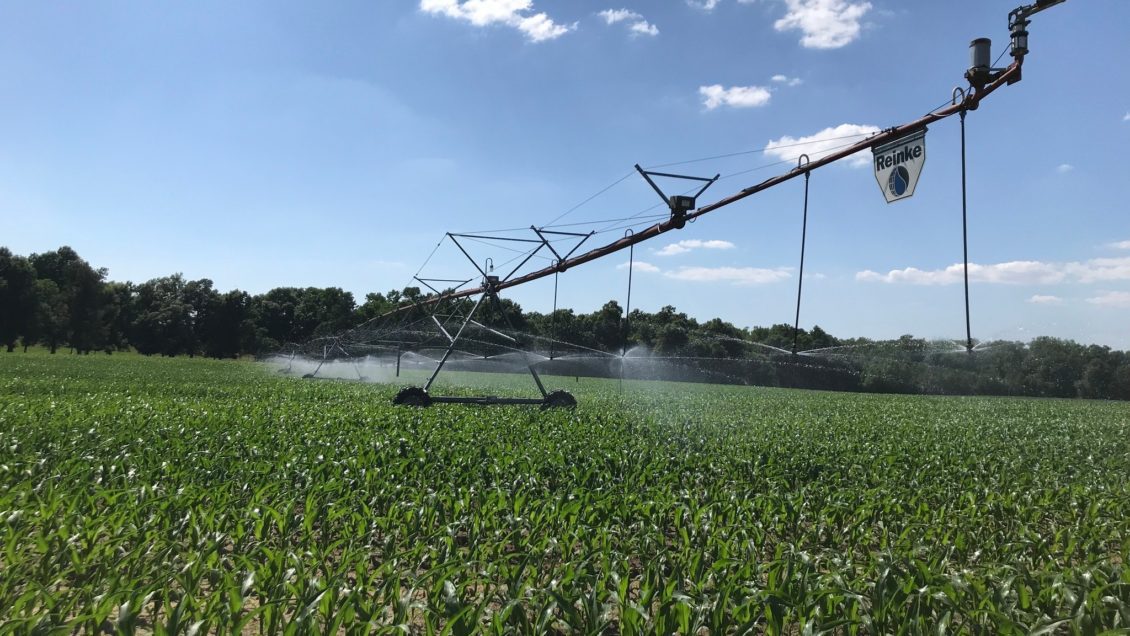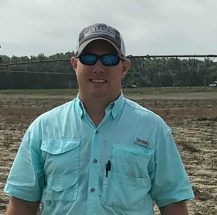
This will save growers money, maximize crop yields and help conserve water.
– Becky Davis, Clemson Extension water resources agent
Center pivot irrigation is gaining popularity as a primary water distribution method used on South Carolina farms and Clemson Extension has a new program to help producers get the most out of their investments and help promote sustainable agriculture.
The program – Center Pivot Irrigation Test Program, or CPIT – is a testing service implemented by Clemson Cooperative Extension Service Water Resources, Agronomic Crops and Horticulture Program teams to provide health check-ups for center pivot irrigation systems. This new program was made possible through software developed by the Clemson Precision Agriculture Team.
South Carolina growers gathered at the Clemson Edisto Research and Education Center (REC) in Blackville, South Carolina and at the Pee Dee REC in Florence, South Carolina, recently to learn about this program and other resources for center pivot irrigation.
Clemson Center Pivot Irrigation Test Program
CPIT tests provide measures of irrigation uniformity to help identify and correct pivot issues. The tests are conducted by members of the Clemson Extension Water Resources Team and cost $125 per pivot.

“This program is used to assess pivots so that they can work more efficiently,” said Becky Davis, a Clemson Extension water resources agent and member of the Water Resources Program Team. “This will save growers money, maximize crop yields and help conserve water.”
Testing usually takes less than two hours and provides information related to irrigation depth in relationship to center and tower locations, positions of observed issues such as clogs and leaks, calibrated timer charts, irrigation costs and more. For more information or to register, go to https://bit.ly/CPIT_Registration.

Jose Payero, assistant professor and irrigation specialist housed at the Edisto REC, said center pivot irrigation use is increasing in South Carolina with 7,500 acres added each year. These systems use a lot of energy. Properly operating pumps use less energy.
“Everyone benefits if we can do something to help reduce costs and environmental impacts associated with energy used to irrigate,” Payero said.
Using irrigation scheduling and soil moisture sensors also can help these systems operate efficiently. Michael Plumblee, assistant professor of agronomy and Clemson Extension corn and soybean specialist, said using these tools can help maximize profit while using less water.

“The two most common problems with irrigating corn are not irrigating early enough and not irrigating long enough,” Plumblee said. “Using irrigation scheduling and soil moisture sensors can help alleviate these problems.”
Soil tension and volumetric sensors are soil moisture sensors most commonly used for scheduling irrigation.
In addition to maximizing profits and using less water, irrigation scheduling benefits also include meeting crop water demand at the appropriate time, reducing the likelihood of plant stress and reducing over-watering. Soil moisture sensors can be used to provide real-time, site-specific monitoring of soil moisture, help determine water sensitive periods throughout the growing season and measure rainfall amounts in the soil and the rooting zone.
Clemson Center Pivot Fertigation Calculator
Precise fertilizer applications also are important for crop growth and the Clemson Precision Agriculture Team has an app for that. Kendall Kirk, Clemson precision agriculture engineer, has created the Clemson Center Pivot Fertigation Calculator (app) to help growers make precise fertilizer applications while irrigating. This process is called fertigating and, in the past, required growers to manually calculate numbers to determine how much liquid fertilizer should be used to fertigate row crops.

“We developed this app to help producers easily and accurately calculate the flow rate of liquid fertilizer and injection pump settings needed to fertigate through a center pivot irrigation system,” Kirk said. “It is designed to make the math a little easier.”
This app can be found at can be found at https://bit.ly/CU_FertigationApp.
Growers benefit
Jimmy Duncan farms in Allendale County. He uses a center pivot irrigation system for his corn, soybeans, peanuts and cotton crops. Duncan has used the Clemson Center Pivot Irrigation Test Program and is pleased with information it provided. He attended the meeting to learn about possible options he should consider for his system.
“I’ve been irrigating since 1978,” Duncan said. “When I heard about this program, I called and had a Clemson crew come out and check my center pivot system to be sure it was operating properly. It appeared to be okay, but I wanted to be sure. I believe growers who irrigate will benefit from this program.”
Duncan grew up on a farm and said irrigation has become a necessary tool to use for his row crops. He uses a moisture meter to determine when to irrigate.
For more information about the Clemson CPIT program, go to https://www.clemson.edu/extension/water/center-pivot/index.html.
Dominion EnergyWise program
Deke Wiggins, Jesse Erbel and Don Smoak from Dominion Energy talked about the EnergyWise program and the importance of practicing safety when working around water and electricity. The EnergyWise program includes agribusiness incentives to help cover some costs involved with installing energy efficiency measures.
“South Carolina is driven by agriculture,” Erbel said. “Improving energy efficiency at agricultural facilities is a simple and effective way to lower costs and boost productivity. We want to provide eligible customers with incentives to help fund projects that reduce energy usage. Our goal is to produce long-term, cost-effective savings for our customers.”
-END-
Members of the Clemson Extension Water Resources Team explain the Center Pivot Irrigation Testing program.
Get in touch and we will connect you with the author or another expert.
Or email us at news@clemson.edu
